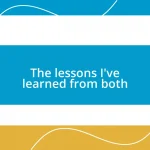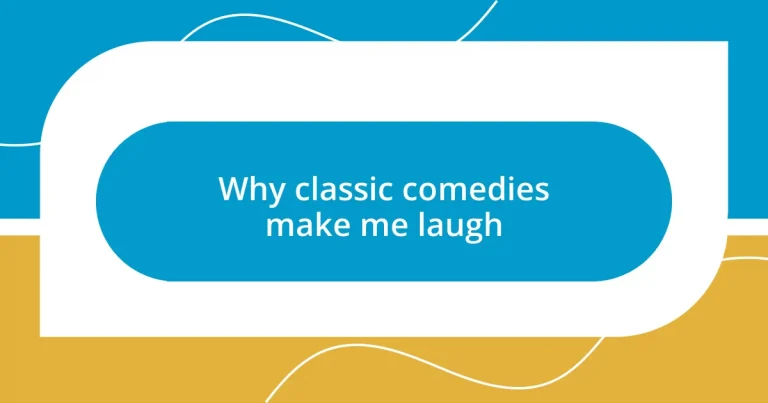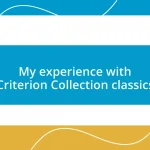Key takeaways:
- Classic comedies combine humor with cultural context, often addressing themes like gender roles and societal norms, making them both relatable and thought-provoking.
- Elements of humor, such as situational irony, slapstick, and sharp dialogue, create memorable comedic moments that transcend time and resonate with audiences.
- Nostalgia enhances the humor in classic comedies, as personal memories tied to these films foster a sense of community and shared experiences among viewers.
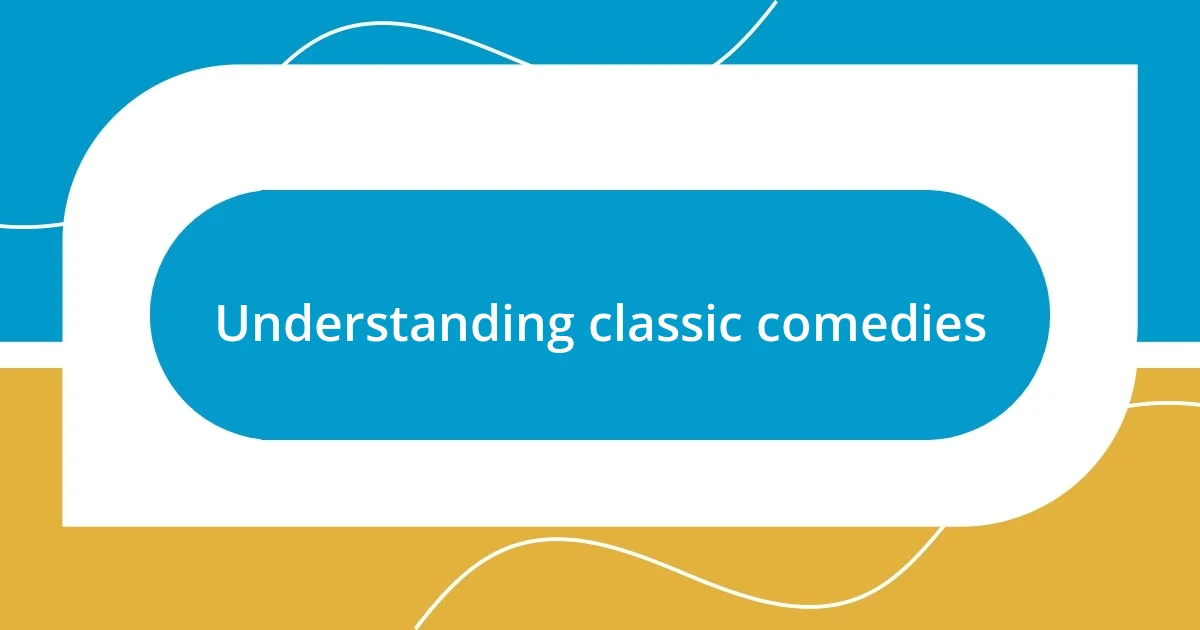
Understanding classic comedies
Classic comedies are a delightful blend of humor, cultural context, and timeless themes. I often find myself laughing at the quick wit and clever scenarios that these films present, reflecting a simpler time when humor relied more on clever dialogue than on special effects. Isn’t it fascinating how a well-timed punchline can transcend decades?
When I dive into a classic like “Some Like It Hot,” I’m reminded of the sheer boldness of its humor. The film’s ability to tackle themes like gender roles and identity, all while keeping us laughing, showcases the brilliance of writing in that era. It makes me wonder—how did they manage to be both provocative and hilarious at the same time?
The charm of classic comedies lies in their uncomplicated narratives and relatable characters. I vividly recall watching “The Odd Couple” with my family; the dynamic between Felix and Oscar felt like a mirror of some of our own quirks and behaviors. Isn’t that what makes these films endure? Their ability to capture the essence of human relationships, flaws and all, makes us laugh—often at ourselves.
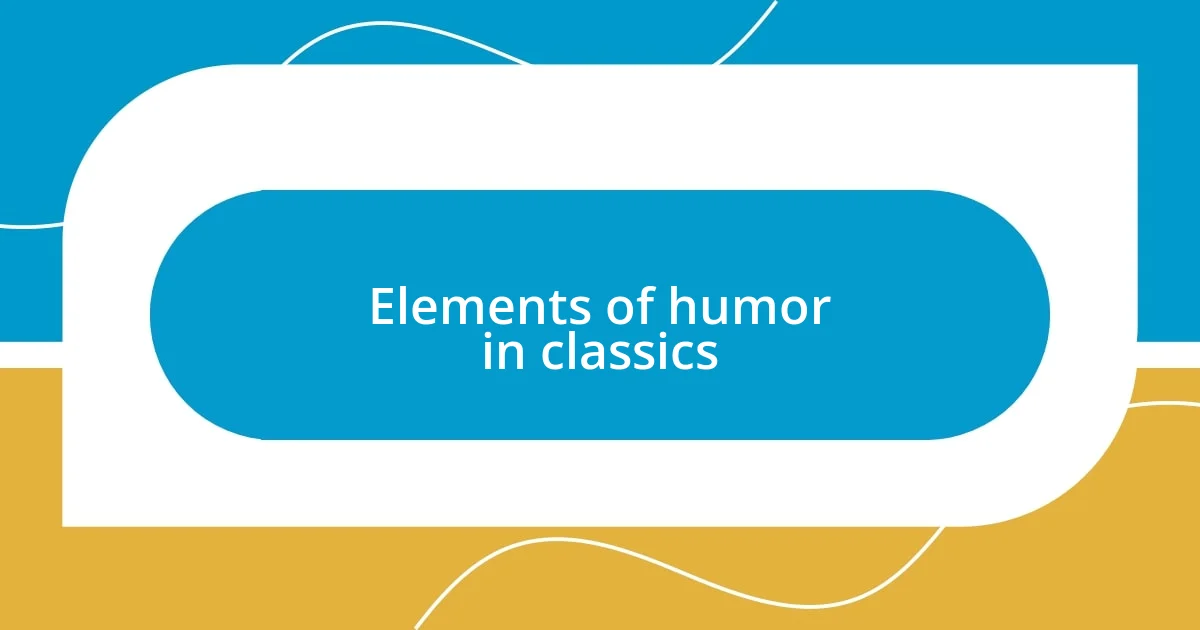
Elements of humor in classics
The humor in classic comedies often hinges on situational irony and misunderstandings. I distinctly remember watching “Airplane!” for the first time, and the way the characters took absurd situations seriously was nothing short of hysterical. Every twist felt unexpected yet perfectly timed, illustrating how a clever setup can lead to laughter that feels spontaneous, even if it’s expertly crafted.
Another vital element is the use of slapstick, where physical comedy takes center stage. When I think about slapstick, I can’t help but smile at the antics of Charlie Chaplin in “The Kid.” His mishaps, laden with emotion and resilience, not only made me laugh but also tugged at my heartstrings. This type of humor proves that physicality can evoke a spectrum of emotions—who knew falling over could be so profoundly funny yet touching?
Lastly, the sharp dialogue in these classics is an essential aspect of their humor. Films like “His Girl Friday” showcase wit that feels both rapid and intelligent. Listening to the banter, I often find myself laughing aloud, appreciating how every line is a piece of the comedic puzzle. There’s something particularly engaging about dialogue that feels alive, capturing the energy of human interaction in such a dynamic way.
| Element of Humor | Example |
|---|---|
| Situational Irony | “Airplane!” |
| Slapstick | “The Kid” |
| Sharp Dialogue | “His Girl Friday” |
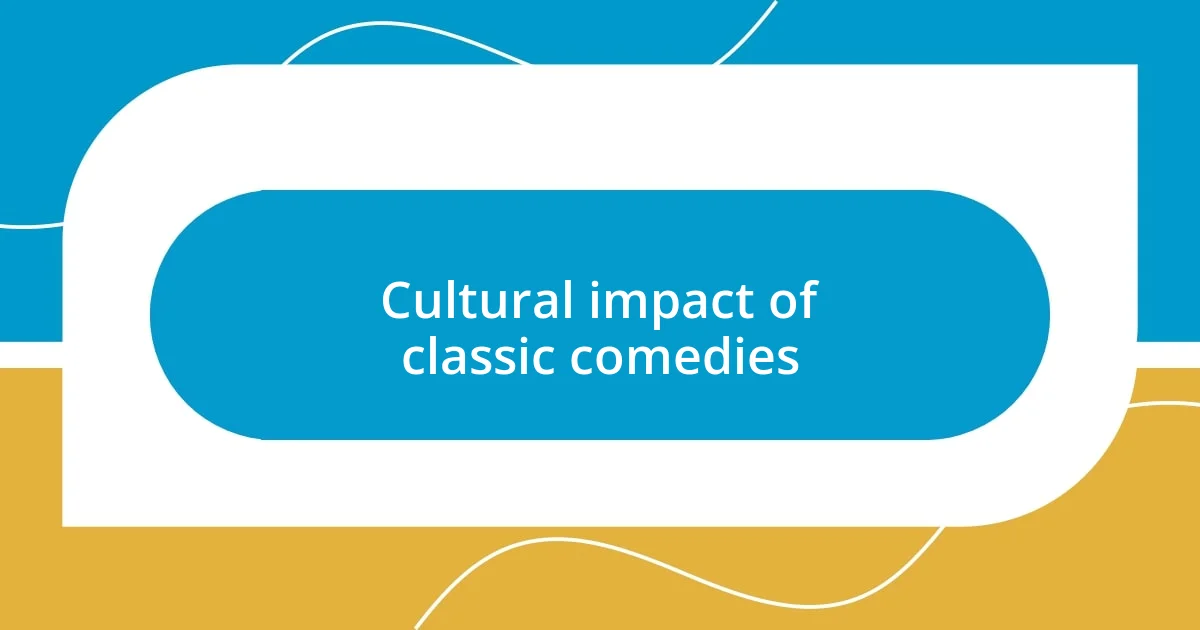
Cultural impact of classic comedies
The cultural impact of classic comedies is significant, shaping not only the film industry but also societal norms. I remember the first time I watched “The Producers” and how the boldness of its satire made me rethink my understanding of humor and taboo. Classic comedies dared to challenge conventions, and that willingness to address controversial topics allowed audiences to engage in dialogue about important issues, often while laughing heartily.
To further illustrate their lasting influence, here are a few key points to consider:
- Genre Evolution: Classic comedies laid the groundwork for modern comedic films, influencing styles and techniques that we see today.
- Cultural Reflection: They often mirror societal attitudes of their time, prompting conversations about cultural shifts and changes in humor.
- Shared Experience: Watching these films becomes a communal experience, as generations bond over the same jokes and memorable quotes, creating a shared cultural context.
- Social Commentary: Many classic comedies tackled issues like race, gender, and class, paving the way for more progressive storytelling in cinema.
In my own life, watching these films with friends has sparked countless discussions about the social issues presented, proving that even amidst laughter, there’s room for deeper reflection. As I share these moments, I can’t help but appreciate how classic comedies foster not just joy, but also awareness and growth.
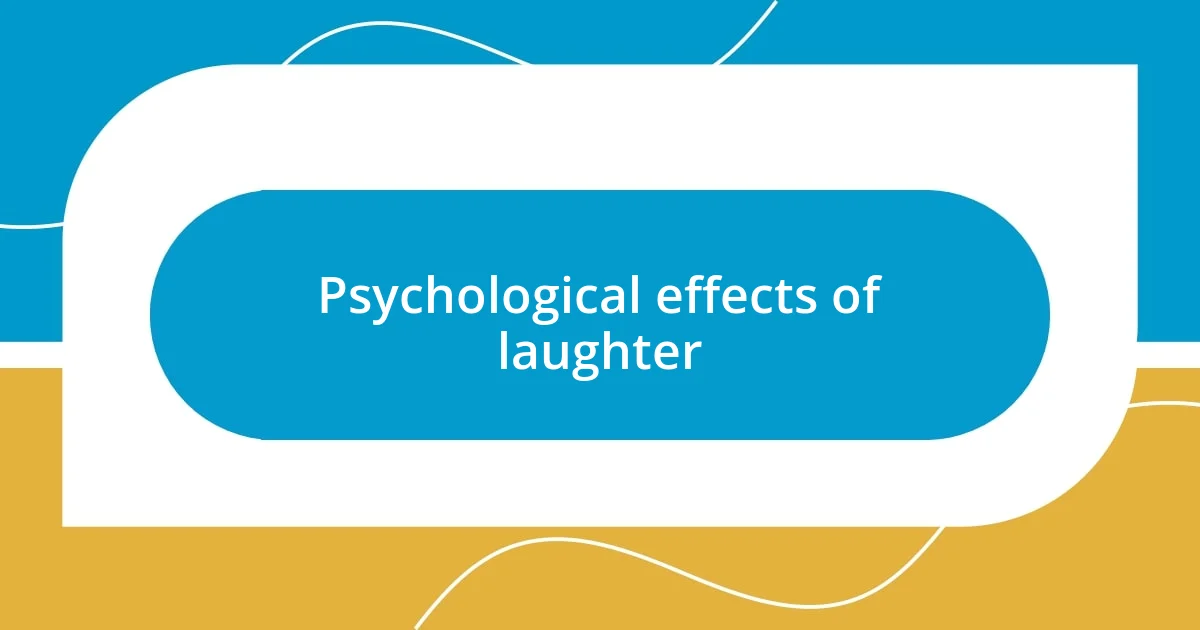
Psychological effects of laughter
Laughter has powerful psychological effects that transcend mere enjoyment; it acts as a natural antidote to stress. Whenever I find myself chuckling during a classic comedy, I notice an immediate shift in my mood. It’s fascinating how a simple laugh can release endorphins—the body’s feel-good chemicals—bringing about a sense of well-being and even a decrease in anxiety. Have you ever laughed so hard that it made your worries feel miles away? I certainly have.
Moreover, laughter fosters social bonding, acting as a psychological glue that connects individuals. I recall a movie night with friends where classic comedies were on the agenda. As we shared moments of joy and laughter, I felt our connections deepen, almost like an unspoken agreement of camaraderie. This shared experience highlights how laughter can create a sense of belonging, making us feel understood and accepted. Doesn’t it feel amazing when you realize you’re all on the same comedic wavelength?
On a more profound level, laughter can also offer perspective on life’s challenges. I often reflect on how characters navigate their absurd predicaments, prompting me to reconsider my own struggles. For instance, after watching “Some Like It Hot,” I felt a renewed sense of resilience, as if the very act of laughing at mishaps can empower me to embrace my own mistakes. It’s a gentle reminder that humor can pave the way for healing and optimism, isn’t it?
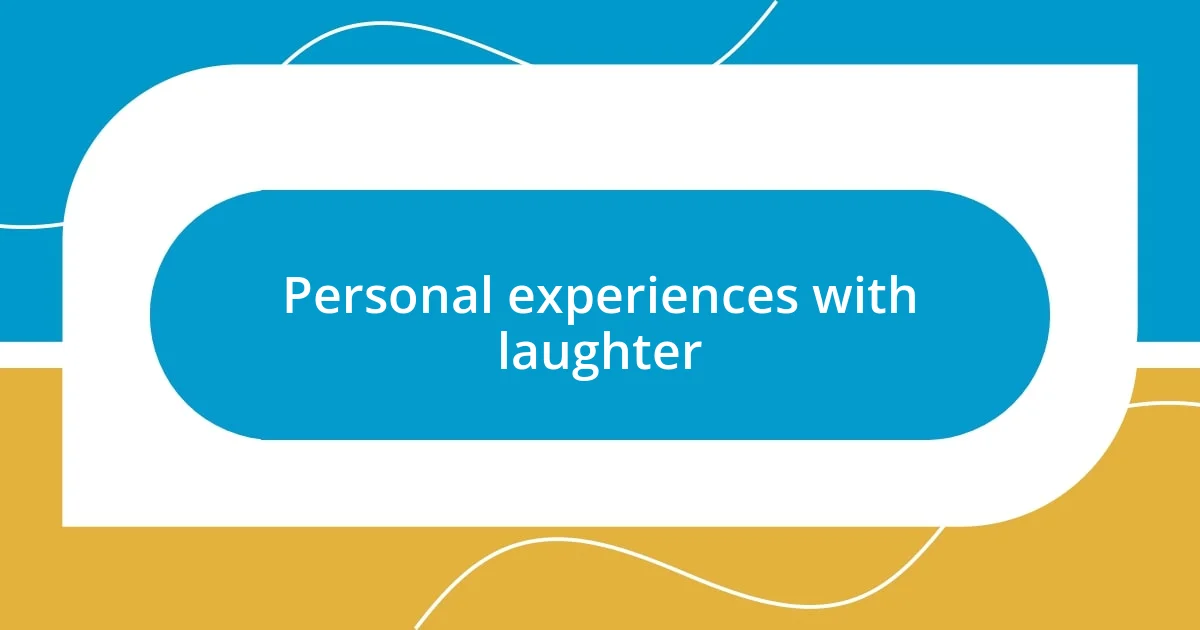
Personal experiences with laughter
There’s something truly magical about laughter, especially when it happens unexpectedly. I vividly remember watching “Airplane!” for the first time. I was alone in my room, and the sheer absurdity of the jokes caught me off guard—I burst into uncontrollable laughter, surprising myself with how cathartic that moment felt. Isn’t it curious how a simple film can create such a profound release?
Then think about those nights spent with friends, crowded on a couch, everyone glued to an old classic. I cherish one particular evening where we couldn’t stop laughing at the antics in “Some Like It Hot.” Each laugh felt like a thread weaving our experiences together, making the world outside our cozy space disappear for a while. I always wonder—what is it about shared laughter that forges such strong bonds?
Reflecting on these moments, I realize laughter often catches me at the perfect time. There have been days when I’ve felt weighed down by life’s complexities, yet a classic comedy comes to the rescue. For instance, repeatedly watching “The Odd Couple” never fails to lift my spirits. The hilarity of Felix and Oscar’s mismatched personalities reminds me of the beauty in embracing our differences while navigating the chaos of life. Have you ever noticed how humor makes hard times just a bit easier to endure?
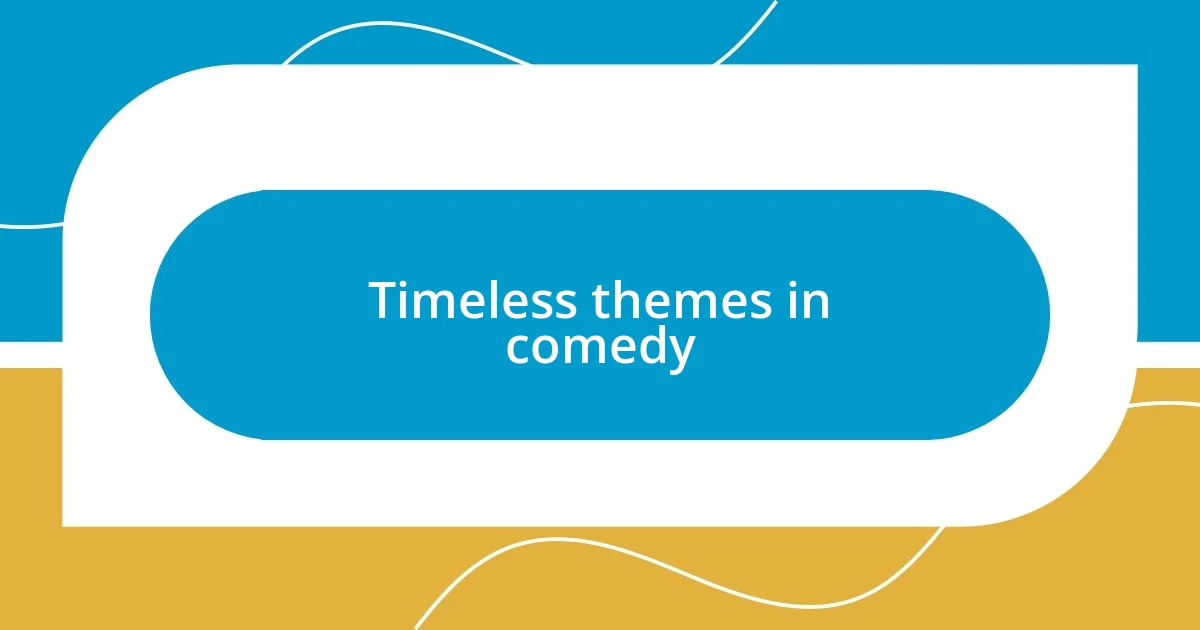
Timeless themes in comedy
Timeless themes in classic comedies often revolve around relatable human experiences, and it’s this very connection that resonates deeply with me. Take the theme of relationships, for instance. Whenever I watch a classic comedy like “When Harry Met Sally,” I can’t help but chuckle at the rollercoaster of emotions in friendships and romance. It reminds me of my own misadventures, like the time I awkwardly confessed my feelings to a friend, only to have it turn into one of the funniest stories I now share. Doesn’t it make you feel better knowing others have navigated the same bumps?
Mistakes and misunderstandings also play a huge role in classic comedies, often bringing about the most memorable moments. Watching characters like George Costanza from “Seinfeld” scramble to get out of ridiculous situations makes me think of my own blunders. I once tried to impress someone by cooking a fancy dinner, only to set off the smoke alarm. Instead of feeling embarrassed, I laughed and embraced the chaos. It’s fascinating how these silly errors make me feel like a part of a larger, shared human experience.
Then there’s the beauty of timing—how a perfectly placed joke or outrageous twist can shape our perception of life’s absurdities. I remember watching “Monty Python and the Holy Grail” on a rainy day. Each absurd sequence and witty jab felt like a reflection of real-life challenges. How often do we face situations that seem ridiculous in hindsight? That’s the power of these timeless comedic themes: they not only entertain but also invite me to reflect on my own experiences with a smile.
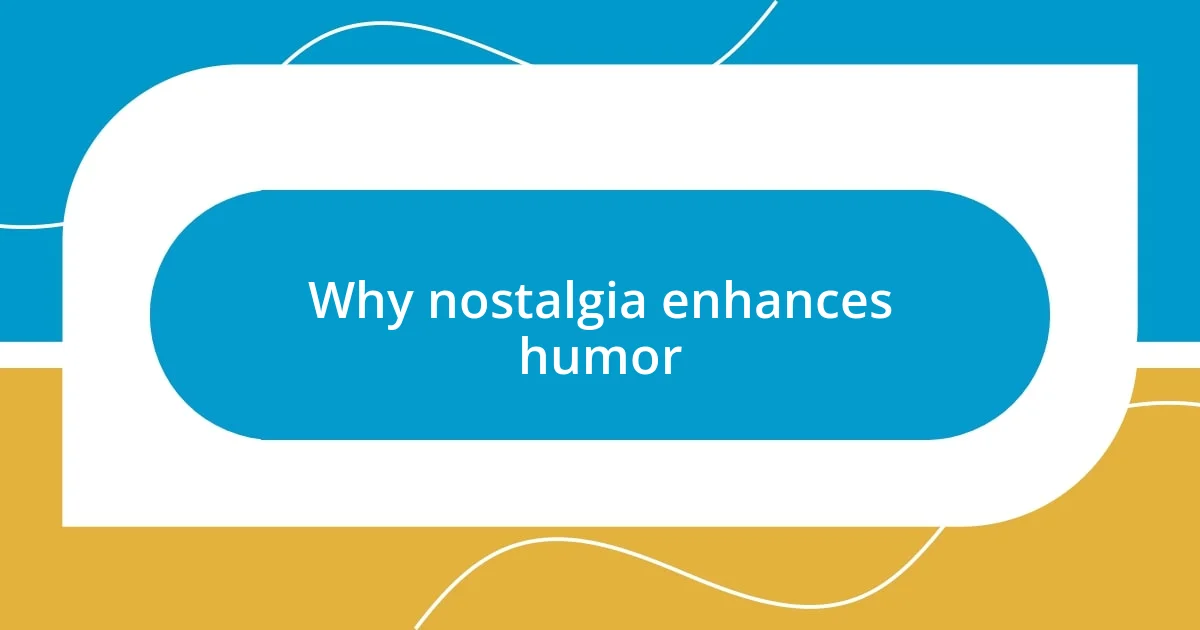
Why nostalgia enhances humor
Nostalgia has this unique ability to enhance humor in classic comedies. When I watch films like “The Princess Bride,” I’m transported back to family movie nights of my childhood. These memories create a comforting backdrop that makes every witty line or silly scenario even funnier. I can’t help but smile as I recall my mother’s infectious laughter; it lingers in the air, adding a layer of happiness to every joke.
Reflecting on those moments, it’s clear that our past shapes how we experience humor. I often find myself chuckling at the comedic misadventures of characters, recalling times when I made similar blunders. Like the time I decided to try my hand at stand-up comedy—only to stumble over my words and leave my friends in stitches instead of cringing. Those shared experiences make every laugh feel like a personal inside joke.
Moreover, nostalgia also creates a sense of community. I remember a family reunion where we all gathered around to rewatch “Ferris Bueller’s Day Off.” The laughter that erupted was contagious, with each joke sparking recollections of our own rebellious antics as kids. Isn’t it fascinating how a simple film can reignite laughter and connect us to those cherished moments? It’s this intertwining of past and present that enhances the joy found in classic comedies, enriching our experiences together.






